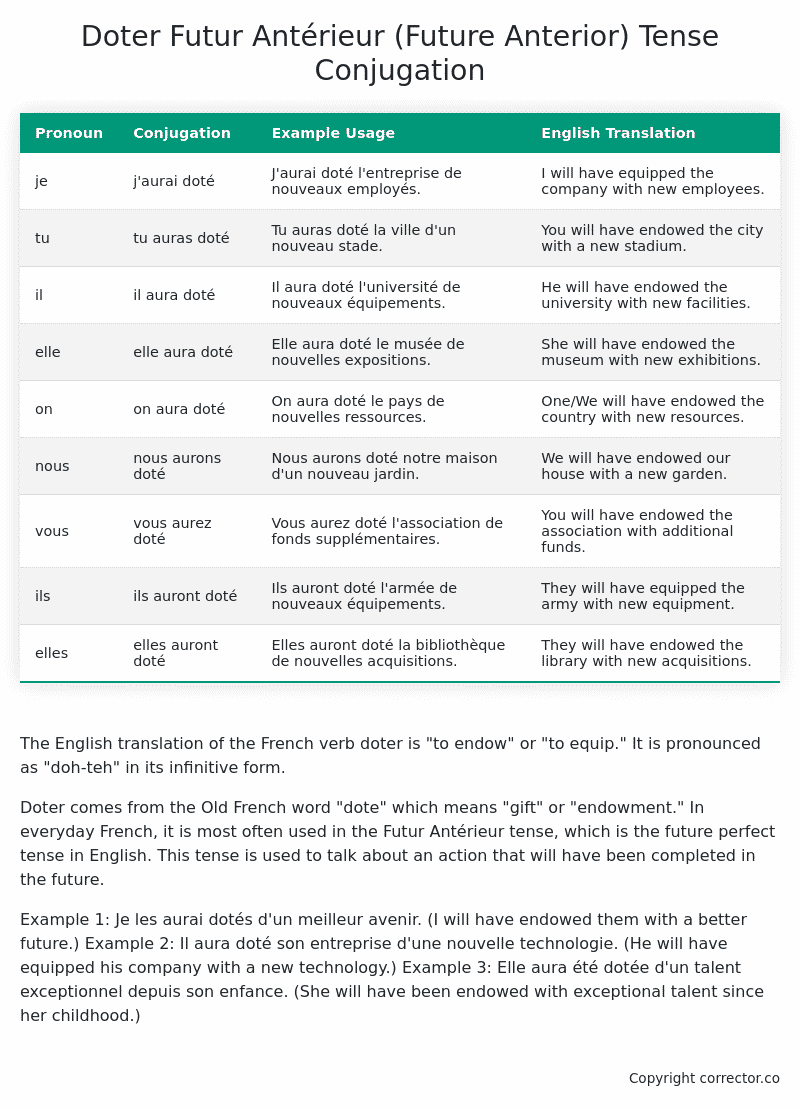Futur Antérieur (Future Anterior) Tense Conjugation of the French Verb doter
Introduction to the verb doter
The English translation of the French verb doter is “to endow” or “to equip.” It is pronounced as “doh-teh” in its infinitive form.
Doter comes from the Old French word “dote” which means “gift” or “endowment.” In everyday French, it is most often used in the Futur Antérieur tense, which is the future perfect tense in English. This tense is used to talk about an action that will have been completed in the future.
Example 1: Je les aurai dotés d’un meilleur avenir. (I will have endowed them with a better future.)
Example 2: Il aura doté son entreprise d’une nouvelle technologie. (He will have equipped his company with a new technology.)
Example 3: Elle aura été dotée d’un talent exceptionnel depuis son enfance. (She will have been endowed with exceptional talent since her childhood.)
Table of the Futur Antérieur (Future Anterior) Tense Conjugation of doter
| Pronoun | Conjugation | Example Usage | English Translation |
|---|---|---|---|
| je | j’aurai doté | J’aurai doté l’entreprise de nouveaux employés. | I will have equipped the company with new employees. |
| tu | tu auras doté | Tu auras doté la ville d’un nouveau stade. | You will have endowed the city with a new stadium. |
| il | il aura doté | Il aura doté l’université de nouveaux équipements. | He will have endowed the university with new facilities. |
| elle | elle aura doté | Elle aura doté le musée de nouvelles expositions. | She will have endowed the museum with new exhibitions. |
| on | on aura doté | On aura doté le pays de nouvelles ressources. | One/We will have endowed the country with new resources. |
| nous | nous aurons doté | Nous aurons doté notre maison d’un nouveau jardin. | We will have endowed our house with a new garden. |
| vous | vous aurez doté | Vous aurez doté l’association de fonds supplémentaires. | You will have endowed the association with additional funds. |
| ils | ils auront doté | Ils auront doté l’armée de nouveaux équipements. | They will have equipped the army with new equipment. |
| elles | elles auront doté | Elles auront doté la bibliothèque de nouvelles acquisitions. | They will have endowed the library with new acquisitions. |
Other Conjugations for Doter.
Le Present (Present Tense) Conjugation of the French Verb doter
Imparfait (Imperfect) Tense Conjugation of the French Verb doter
Passé Simple (Simple Past) Tense Conjugation of the French Verb doter
Passé Composé (Present Perfect) Tense Conjugation of the French Verb doter
Futur Simple (Simple Future) Tense Conjugation of the French Verb doter
Futur Proche (Near Future) Tense Conjugation of the French Verb doter
Plus-que-parfait (Pluperfect) Tense Conjugation of the French Verb doter
Passé Antérieur (Past Anterior) Tense Conjugation of the French Verb doter
Futur Antérieur (Future Anterior) Tense Conjugation of the French Verb doter (this article)
Subjonctif Présent (Subjunctive Present) Tense Conjugation of the French Verb doter
Subjonctif Passé (Subjunctive Past) Tense Conjugation of the French Verb doter
Subjonctif Imparfait (Subjunctive Imperfect) Tense Conjugation of the French Verb doter
Subjonctif Plus-que-parfait (Subjunctive Pluperfect) Tense Conjugation of the French Verb doter
Conditionnel Présent (Conditional Present) Tense Conjugation of the French Verb doter
Conditionnel Passé (Conditional Past) Tense Conjugation of the French Verb doter
L’impératif Présent (Imperative Present) Tense Conjugation of the French Verb doter
L’infinitif Présent (Infinitive Present) Tense Conjugation of the French Verb doter
Struggling with French verbs or the language in general? Why not use our free French Grammar Checker – no registration required!
Get a FREE Download Study Sheet of this Conjugation 🔥
Simply right click the image below, click “save image” and get your free reference for the doter Futur Antérieur tense conjugation!

Doter – About the French Futur Antérieur (Future Anterior) Tense
Construction
Common Everyday Usage Patterns
Interactions with Other Tenses
For example
Summary
I hope you enjoyed this article on the verb doter. Still in a learning mood? Check out another TOTALLY random French verb conjugation!


